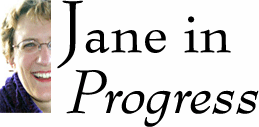 |
|
 |
 |
Looking for tips and tricks to the art of writing for television? Welcome to the blog of experienced television writer Jane Espenson. Check it out regularly to learn about spec scripts, writing dos and don'ts, and what Jane had for lunch! (RSS:  ) |
|
|
Home » Archives » September 2006 » Marjorie is in Trouble
[Previous entry: "The Spiner of the Story"] [Next entry: "What's an analogy like?"]
09/05/2006: Marjorie is in Trouble
Is there a moment in your spec script in which your main character takes a big decisive action that changes everything? Probably, huh?
If your spec script were being filmed, the actor and director and editor would extend that moment. Music, camera work, acting would all come together, and the audience couldn't possibly miss that something huge was going on.
But unless you get lucky, and the person reading your spec happens to be listening to a providentially synched-up iPod, you won't have the advantage of any of that great stuff.
So here's a great place to use a big obvious stage direction. Something like:
Ralph takes a breath and squares his shoulders. His moment has come.
Or
Tony picks up the shovel and turns slowly to face Marjorie. He knows what he has to do.
Or
Bethany whirls toward the door, her eyes wild. For the first time, she's acting without thinking, doing the right thing without overanalyzing it.
I know these examples sound a bit over-dramatic, lying here all defenseless and out of context. They may even seem to violate a principle of screenwriting as taught to you by others, in that they essentially tell the reader what to feel. So what? Telling a reader what to feel *is* telling them what to see, because these directions are the equivalent of heroic camera angles and all those filmic tricks. They help a reader understand your story.
And they can have a bit of poetry to them, as well, which gives you a chance to show off your confidence with manipulating prose. And any time you can demonstrate confidence, your perceived competence goes up. Niiiice.
Lunch: focaccia and hummus from California Pizza Kitchen.
|
|
|
 |
|
Get Blog Updates Via Email
|
|
 |

